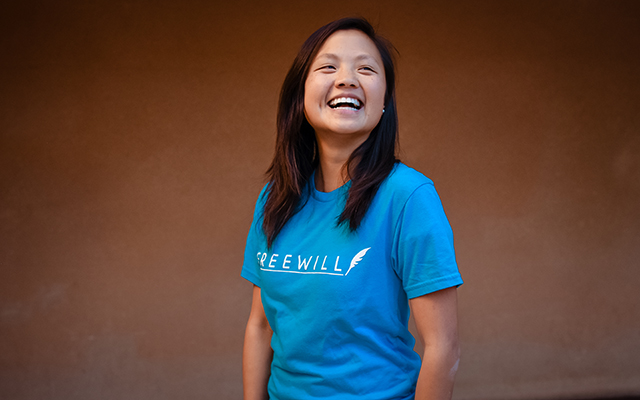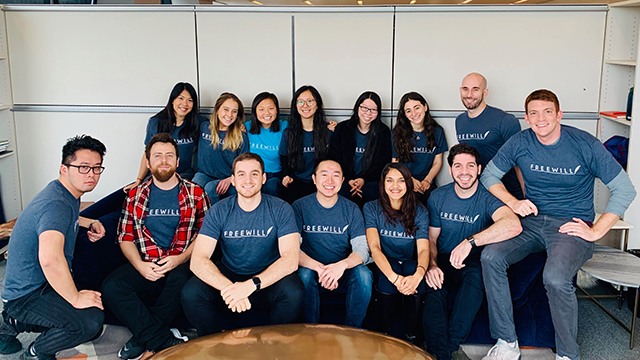Where there’s a will, there’s a way to make an impact
Charitable bequests are often the most significant donations nonprofit organizations receive, yet only about 40 percent of U.S. adults have a will, according to a recent Gallup poll.
A startup co-founded by alumna Jenny Xia, A.B. ’12, is addressing both these issues. FreeWill provides a free, online will generation platform, and enables charities to easily launch targeted planned giving campaigns.
“We make it super-easy to give charitably in the course of making your will, and because of that, the charitable giving rate on our platform is six times higher than the national average,” Xia said. “We have been able to raise more than a quarter billion dollars for charities, and this is critically important because the typical bequest is three times larger than the cumulative lifetime giving of the average individual.”
In only about 20 minutes, a FreeWill user can create a will that is legal and binding. The user-friendly website asks a series of straightforward questions about a person’s background and wishes that are used to develop the will.

Xia co-founded FreeWill in 2017 to make it easier for individuals to create wills and simplify the planned giving process for charities. (Photo by Kate Rowe)
For those who have more complicated estates, FreeWill helps document all relevant wishes, then assists in finding a qualified attorney who is near the user, potentially saving both time and money.
The only off-line step involves printing the document and signing it in front of witnesses. The relevant state laws regarding how a document must be finalized are clearly spelled out by FreeWill.
Nonprofit sponsorships enable the platform to remain free, Xia explained. Charities pay for customized versions of FreeWill they can distribute to supporters, eliminating many expensive and time-consuming donor visits that form the crux of traditional planned giving campaigns.
The platform’s simplicity resonates with charities and donors. Since Xia and co-founder Patrick Schmitt launched FreeWill in January, 2017, more than 60 nonprofits have created sponsored planned giving campaigns and nearly 23,000 people have made wills.
“People find the traditional process of creating a will to be scary, complicated, and expensive,” Xia said. “Trusts and estates are worn down by so much legal jargon. We make it our job to ensure that our platform uses words people actually use in their daily lives, and we take the whole process piece by piece.”
In launching FreeWill, which combines sleek technology and behavioral nudges to streamline end-of-life planning, Xia drew on lessons she learned while earning an applied math degree at the Harvard John A. Paulson School of Engineering and Applied Sciences (SEAS).
She had been fascinated by numbers from a young age, but wanted to use her quantitative talents to make an impact on the real world.
At Harvard, she got her chance.
With David Laibson, Robert I. Goldman Professor of Economics, Xia researched the use of behavioral nudges to encourage people to save more for retirement. She explored technological applications for philanthropic organizations in Introduction to Computer Science (CS50).
She found that she loved creating things, and that passion for problem solving fueled her interest in entrepreneurship.

The FreeWill team, which also includes SEAS alumni Jake Gober A.B. '18, and Lakshmi Parthasarthy A.B. '12. (Photo courtesy of FreeWill)
While working as a business analyst at McKinsey and Company after graduation, she joined forces with her freshman next-door neighbor, Eric Glyman, A.B. ’12, to help launch Paribus, a startup that automatically applies for retailer rebates on a customer’s behalf (Paribus was acquired by Capital One in 2016).
Though Xia wasn’t ready to enter the entrepreneurial world full time, she found an outlet for her philanthropic passions when she joined Bain Capital as a private equity associate. She helped launch the firm’s Impact Investing Fund, which invests in firms with a double bottom line—financial impact and social impact.
“That was a nice marriage of technology and numbers, with a few impact areas I care deeply about, like education and health care,” she said. “I really enjoyed learning about these spaces, but my personality isn’t one where I want to sit around a desk and think about what the right answer should be. I want to do something about it.”
So she enrolled at Stanford to earn an MBA, and met Schmitt during the second week of classes. While trying to write his own will, Schmitt had become frustrated by how onerous the process was. The two partnered up to tackle the problem with technology.
The biggest challenge they faced in launching FreeWill was convincing stakeholders and investors that people would actually use the product. Having surpassed that hurdle, the day-to-day challenges of running a startup are never ending, but Xia relies on a stellar team, which includes fellow SEAS alumni Jake Gober A.B. '18, and Lakshmi Parthasarthy A.B. '12, to drive FreeWill forward.
“The biggest lessons I’ve learned is that culture eats strategy for breakfast,” she said. “The success we’ve had so far, relative to our mission, is driven by the deep intent and passionate culture that we’ve built at FreeWill. Everyone here is super-passionate about the social impact.”
Xia expects that impact to be amplified in the future. The team is preparing to roll out features that allow users to create advanced health care directives and powers of attorney using FreeWill, which could help save the health care system billions of dollars.
And with the population of Baby Boomers aging, more than $35 trillion is due to be inherited in the U.S. in the next two decades, marking the largest wealth transfer in human history.
“Baby Boomers could fundamentally change the landscape of philanthropy, if they decide to,” she said. “Being at this very historic moment and trying to provide a product and service that will make it easier for people to funnel those resources towards high-impact causes is so rewarding.”